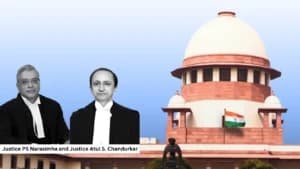The Supreme Court Advocates on Record Association (SCAORA) recently submitted a set of recommendations to the Supreme Court to improve the guidelines and code of conduct for Advocates-on-Record (AORs) and the process for senior designation. These suggestions aim to refine the legal framework governing the legal profession, specifically in terms of AOR conduct and the designation of senior advocates.
The Supreme Court, in an ongoing case concerning false statements and suppression of material facts made by a Senior Advocate in multiple remission pleas, has recognized the need for judicial reforms in this area. After a false affidavit was filed, Justices Abhay S. Oka and AG Masih addressed the issue by deciding to lay down guidelines for AORs. This case also saw Senior Advocate Dr. S. Muralidhar being appointed as Amicus Curiae, with valuable input from SCAORA's President, Vipin Nair.
Read Also:- Supreme Court Acquits Murder Accused Extrajudicial Confession Lacked Credibility
The SCAORA's suggestions to refine the senior designation process focus on ensuring more comprehensive assessments of AORs and improving the fairness and transparency of the designation process. These include:
Real-Time Assessment: Instead of evaluating AORs solely based on the number of appearances, the process should consider their contribution to the bench. Judges' comments should be solicited to better gauge the AOR's impact on cases.
Quality of Drafting: The drafting quality should be an essential factor in the assessment of an AOR. This involves evaluating succinct pleadings, framing of questions of law, and the application of legal precedents.
Permanent Committee Composition: The Permanent Committee for senior designation should include the senior-most office bearers of SCAORA and the Supreme Court Bar Association as ex-officio members, ensuring proper representation.
Additional Marks for Training: AORs who engage in educational activities such as lecturing and training modules for fellow advocates should receive additional marks in the assessment process.
Transparency in Evaluation: Marks assigned during the evaluation process should be communicated to AORs prior to the interview stage, with a suggested reduction in the weightage for personal interaction, which currently stands at 25 marks.
Read Also:- Supreme Court Woman Entitled to Maintenance from Second Husband Despite Legally Undissolved First Marriage
The SCAORA also proposed measures to regulate the conduct of AORs more effectively, emphasizing the need for regular and structured training. The suggestions include:
Implementation of Supreme Court Rules, 2013: It is essential to implement and regularly update the Supreme Court Rules, which already contain provisions for regulating AOR conduct. A mandatory training program should be introduced for AORs upon clearing the examination and every two years thereafter.
Representation in Board of Examiners: SCAORA should have adequate representation in the Board of Examiners that conducts the AOR exam, ensuring the examiners understand the challenges and perspectives of AORs.
Training Programs: SCAORA is willing to organize regular workshops, symposiums, and training modules covering professional ethics, legal advancements, and practice procedures. This would keep AORs up-to-date with procedural changes and enhance their efficiency.
Open Houses for Interaction: Regular "Open Houses" should be held for AORs to interact with the Registry officials to clarify doubts and resolve issues related to the filing, registration, and verification of cases. These interactions will improve the efficiency of case listings and eliminate unnecessary delays caused by inconsistent procedures.
Read Also:- Registry Cannot Delete a Case from Cause List Without Court's Order Supreme Court
Direct Interaction with Clients: AORs should have the opportunity to meet clients directly, either in person or through video conferencing, to clarify the factual matrix of the case. A certification from the client should be included in the pleadings filed with the Supreme Court Registry.
Verification of Pleadings: AORs must personally verify the pleadings before signing them, as emphasized in the court's judgment in the case of Rameshwar Prasad Goyal, In re, which clarified that an AOR should not be a mere “postman.”
Effective Training Before Exam: AORs should complete meaningful training under the guidance of an experienced AOR before taking the examination. The training should be practical, with detailed reports on the work undertaken during the training period.
Sequencing of Cases: The current system of sequencing cases in the Supreme Court has caused significant inconvenience to AORs and other stakeholders. SCAORA suggests that this system be reconsidered or discontinued as it disrupts case preparation and causes delays.














